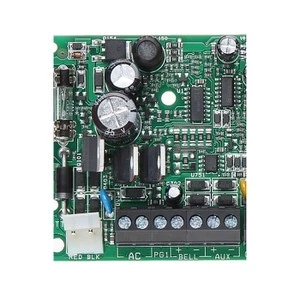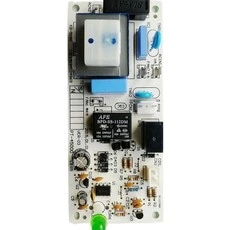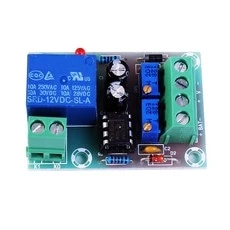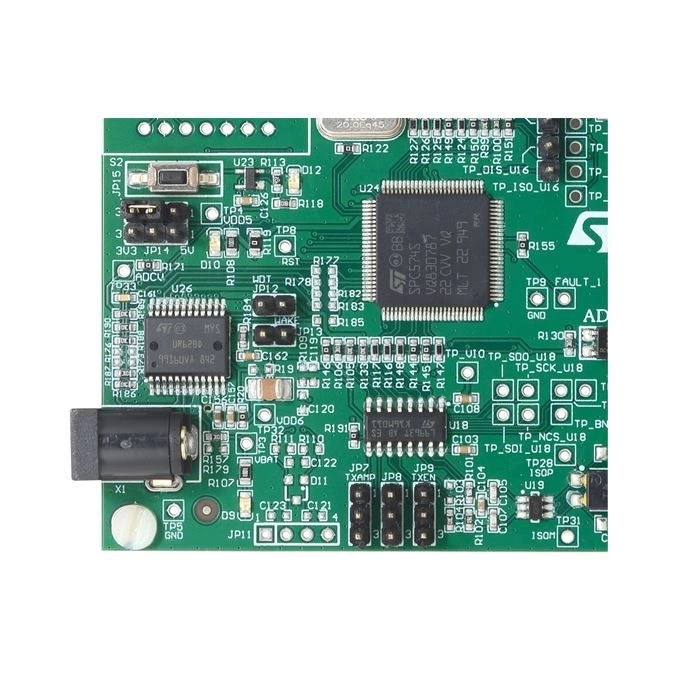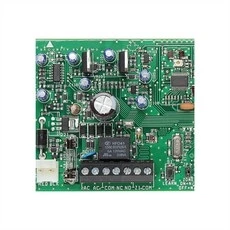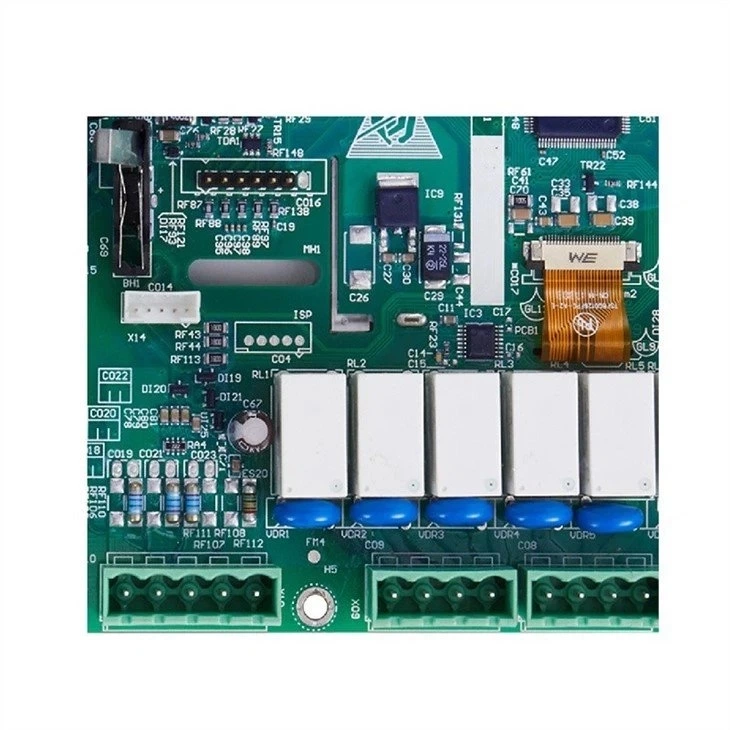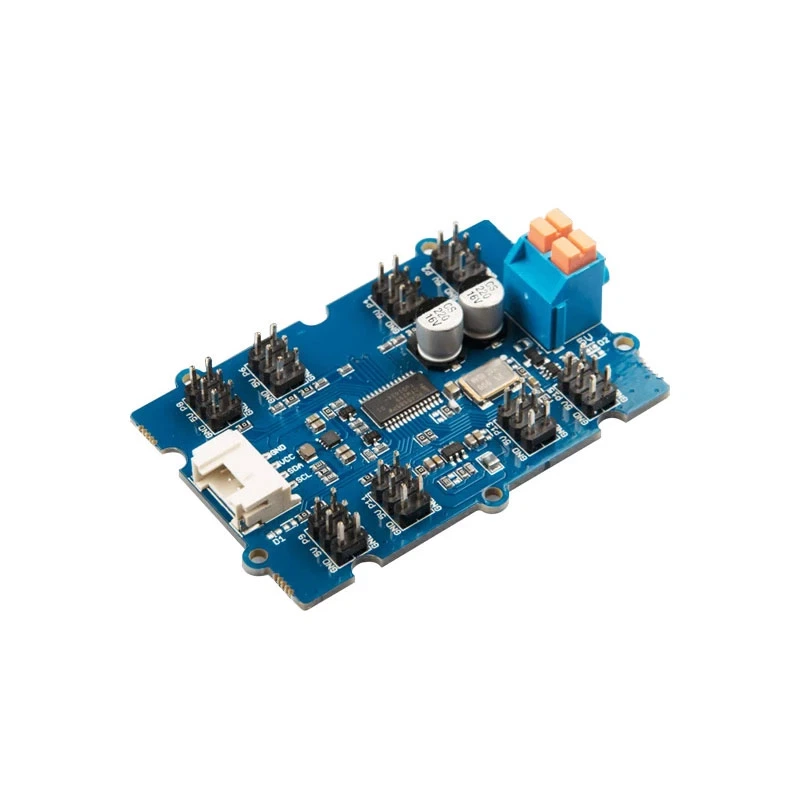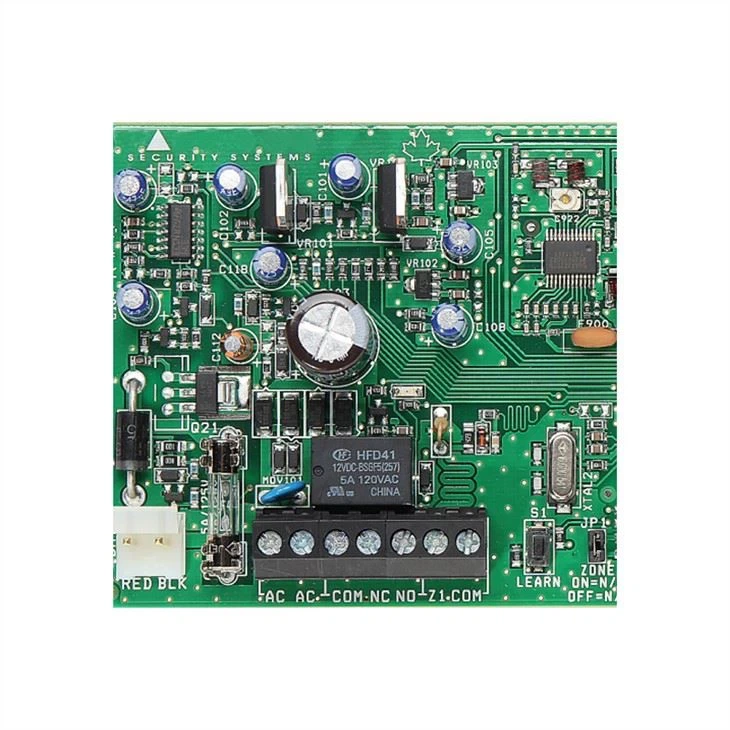Unveiling The Secrets Of A Nice PCBA Supplier: Your Guide To Finding A Reliable Partner
Unveiling the Secrets of a Nice PCBA Supplier: Your Guide to Finding a Reliable Partner
Introduction
A. Key Considerations When Selecting a PCBA Supplier
B. Benefits of Partnering with a Trusted PCBA Manufacturer
C. How to Identify a Nice PCBA Supplier?
D. Frequently Asked Questions about PCBA Suppliers
Key Considerations When Selecting a PCBA Supplier
Quality Assurance Measures
It is crucial to assess the supplier's commitment to quality control.
Look for certifications like ISO 9001, IPC-A-610, or other industry-specific standards.
Evaluate their quality testing procedures, such as functional testing, inspection, and defect detection.
Inquire about their track record for producing reliable and defect-free PCBAs.
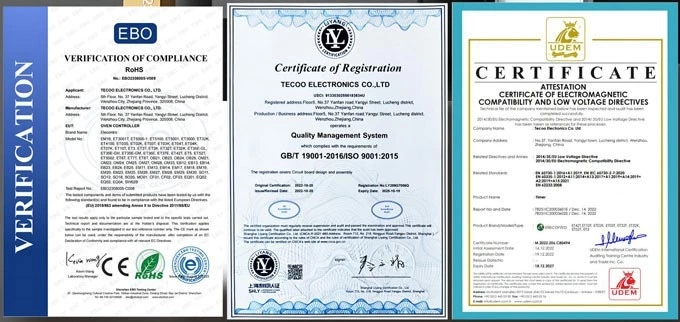
Manufacturing Capabilities and Technology
Assess the supplier's manufacturing facilities and equipment.
Check if they have the necessary technology and machinery to handle your specific PCB assembly requirements.
Consider their expertise in surface mount technology (SMT) and through-hole assembly.
Evaluate their capability to produce PCBAs of varying complexities and sizes.
Customization and Flexibility
Determine the supplier's ability to tailor PCBA solutions to your unique needs.
Look for flexibility in accommodating design changes or modifications.
Consider their support for low-volume and high-mix production runs.
Assess their engineering and design support for custom PCB layouts.
Lead Time and Delivery Reliability
Inquire about their typical lead times for PCB assembly projects.
Assess their ability to meet your delivery deadlines consistently.
Discuss contingency plans for unexpected delays or supply chain disruptions.
Evaluate their global distribution network for reliable shipping.
Pricing and Cost Efficiency
Compare pricing structures and quotes from multiple suppliers.
Consider the total cost of ownership, including assembly, materials, and shipping.
Evaluate the supplier's transparency in pricing and billing.
Seek cost-saving suggestions or value-added services they can provide.
Benefits of Partnering with a Trusted PCBA Manufacturer
Enhanced Product Quality and Reliability
Collaborating with a reputable PCBA manufacturer ensures that your products meet high-quality standards.
Their rigorous quality control processes reduce the risk of defects and product failures.
Reliable components and manufacturing practices enhance the overall reliability of your electronic devices.
Improved product quality leads to enhanced customer satisfaction and reduced warranty claims.
Expertise and Technical Support
Trusted PCBA manufacturers often have a team of experienced engineers and technicians.
They can provide valuable technical expertise during the design and manufacturing phases.
Assistance with component selection, design optimization, and troubleshooting can result in better-performing products.
Access to their knowledge base can help address complex challenges efficiently.
Streamlined Supply Chain Management
Partnering with a reliable manufacturer simplifies the supply chain.
They manage component sourcing, inventory, and procurement on your behalf.
This reduces the burden of supply chain management, minimizes lead times, and ensures a smoother production process.
It also helps avoid supply chain disruptions and component shortages.
Time and Cost Savings
Trusted PCBA manufacturers often have efficient production processes.
This can lead to shorter lead times, allowing you to get your products to market faster.
Bulk purchasing power can result in cost savings on components and materials.
Reduced rework and lower defect rates translate into cost savings in the long run.
How to Identify a Nice PCBA Supplier?
Research and Background Check
Conduct thorough research on potential PCBA suppliers.
Examine their history, reputation, and industry presence.
Verify their years of experience in PCB manufacturing and assembly.
Investigate their financial stability to ensure long-term reliability.
Client Testimonials and Reviews
Seek out client testimonials and reviews of the supplier's services.
Analyze feedback from past and current customers regarding their experiences.
Look for patterns of positive feedback related to quality, reliability, and customer service.
Consider reaching out to previous clients for direct references.
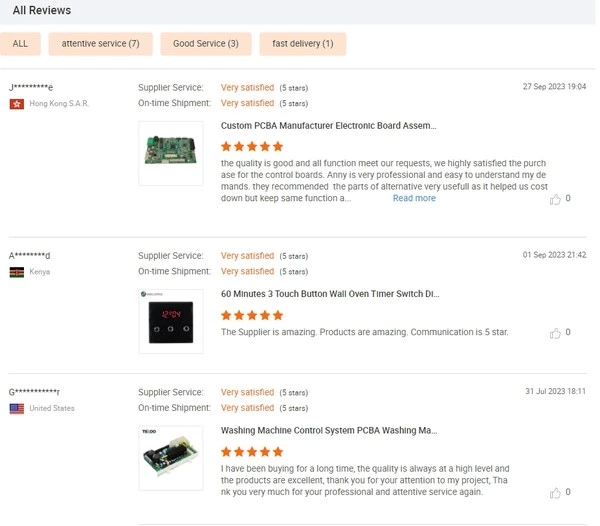
Check for relevant certifications and industry compliance.
Look for certifications such as ISO 9001, ISO 13485 (for medical devices), or IPC-A-610 (for electronic assemblies).
Ensure that the supplier adheres to industry standards and regulations.
Compliance with environmental standards like RoHS and REACH is also essential.
Communication and Responsiveness
Evaluate the supplier's communication skills and responsiveness.
Assess their ability to address inquiries, provide timely quotes, and offer technical support.
A responsive supplier can help resolve issues quickly and efficiently.
Clear and open communication is vital for a successful partnership.
Frequently Asked Questions about PCBA Suppliers
①What is the role of a PCBA supplier?
A PCBA (Printed Circuit Board Assembly) supplier plays a critical role in the electronics manufacturing process. Their primary responsibility is to manufacture and assemble printed circuit boards (PCBs) and associated components to create functional electronic devices. Here are the key roles and responsibilities of a PCBA supplier:
PCB Manufacturing: PCBA suppliers often have the capability to manufacture the actual PCBs. This involves creating the circuit layout, etching copper traces, and applying solder mask and silkscreen layers. High-quality PCB fabrication is essential for the overall performance and reliability of the electronic device.
Component Sourcing: PCBA suppliers source and procure electronic components such as resistors, capacitors, integrated circuits, connectors, and more. They must ensure that the components meet the required specifications and quality standards.
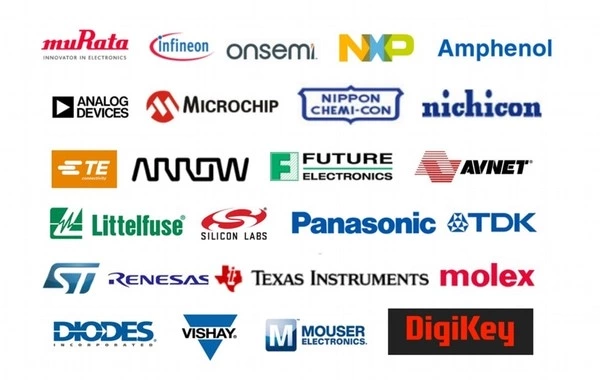
Assembly: PCBA suppliers assemble the PCBs by populating them with electronic components. This process can involve surface-mount technology (SMT) and through-hole technology (THT) assembly techniques. They must have the equipment and expertise to handle various component sizes and types.
Quality Control and Testing: Quality control is a critical aspect of PCBA manufacturing. Suppliers are responsible for inspecting and testing the assembled PCBs to identify defects, ensure functionality, and meet quality standards. This may include visual inspection, functional testing, and automated testing using specialized equipment.
Prototyping and Small to Large-Scale Production: PCBA suppliers can handle projects ranging from small-scale prototypes to large-scale production runs. They must adapt to the specific needs and volume requirements of their clients.
Design for Manufacturability (DFM) and Design for Testability (DFT) Support: PCBA suppliers may offer guidance to their clients on optimizing the design of PCBs and electronic assemblies for ease of manufacturing and testing. This can help reduce production costs and improve product reliability.
Supply Chain Management: Effective management of the supply chain is crucial for on-time delivery and cost control. PCBA suppliers coordinate the procurement of components, manage inventory, and ensure timely delivery of finished assemblies.
Customization and Flexibility: PCBA suppliers often offer customization services to meet the unique requirements of their clients. They may accommodate special component requests, specific assembly processes, and other customization needs.
Regulatory Compliance: PCBA suppliers must adhere to industry and regulatory standards, such as RoHS (Restriction of Hazardous Substances) and IPC (Institute for Printed Circuits) standards, to ensure that the assembled products comply with environmental and safety requirements.
Packaging and Shipping: Once the PCBAs are assembled and tested, the supplier may handle the packaging and shipping of the finished products to the client or directly to end-users if required.
Overall, a PCBA supplier plays a crucial role in the electronics manufacturing ecosystem by providing expertise, resources, and services that enable the efficient and cost-effective production of electronic devices. Choosing the right PCBA supplier is essential for the success of any electronics project.
②How to assess the quality of a PCBA supplier's products?
Assessing the quality of a PCBA (Printed Circuit Board Assembly) supplier's products is crucial to ensure the reliability and performance of your electronic devices. Here are steps you can take to evaluate the quality of a PCBA supplier's products:
Review Their Quality Control Processes:
Request information about the supplier's quality control processes and standards. They should have documented procedures for inspection, testing, and quality assurance.
Inspect Their Facility:
If possible, visit the supplier's manufacturing facility. Observe their production processes, cleanliness, organization, and the condition of their equipment. A well-maintained facility often reflects a commitment to quality.
Ask for Certifications and Compliance:
Inquire about industry certifications and compliance with relevant standards, such as ISO 9001 for quality management systems, ISO 13485 for medical devices, or IPC standards for electronics manufacturing.
Request References and Case Studies:
Ask the supplier for references from previous customers and case studies showcasing their successful projects. Contact these references to learn about their experiences with the supplier.
Examine Component Sourcing:
Verify the supplier's sources for electronic components. Reputable suppliers will use authorized distributors and provide traceability for components, ensuring they are genuine and meet specifications.
Quality Testing and Inspection:
Inquire about the types of testing and inspection they perform on PCBAs. This may include functional testing, in-circuit testing, automated optical inspection (AOI), and X-ray inspection for hidden defects.
Quality Documentation:
Ask for documentation related to quality control and testing, such as inspection reports, test records, and certificates of compliance for components used in the assembly.
Supplier's Track Record:
Research the supplier's reputation and track record in the industry. Online reviews, customer testimonials, and industry forums can provide insights into their reliability and quality.
Quality Control Personnel:
Inquire about the qualifications and expertise of the supplier's quality control team. Experienced personnel are more likely to identify and address quality issues effectively.
Audit Capability:
Determine if the supplier is open to third-party audits of their quality management system and manufacturing processes. This can provide an impartial assessment of their quality practices.
Sampling and Prototyping:
Start with small-scale orders or prototypes to assess the supplier's quality before committing to larger production runs. This allows you to evaluate their performance firsthand.
Communication and Responsiveness:
Gauge the supplier's communication skills and responsiveness to your inquiries. Clear and timely communication is essential for addressing quality concerns and resolving issues promptly.
Cost vs. Quality Balance:
While cost is a consideration, be cautious of suppliers offering significantly lower prices, as this may lead to compromises in quality. Balance cost considerations with quality assurance.
Long-Term Relationship:
Consider the potential for a long-term relationship with the supplier. A stable, trusted partnership can lead to improved quality and cost efficiencies over time.
By thoroughly evaluating these aspects, you can gain confidence in the quality of a PCBA supplier's products and make an informed decision when selecting a partner for your electronic manufacturing needs. Regular communication and ongoing quality monitoring can help maintain and improve product quality throughout your partnership.
③What factors should be considered when comparing PCBA suppliers?
When comparing PCBA (Printed Circuit Board Assembly) suppliers, it's essential to consider various factors to make an informed decision. Here are key factors to evaluate when comparing PCBA suppliers:
Quality and Reliability:
Assess the supplier's track record for producing high-quality and reliable PCBAs. Look for certifications, compliance with industry standards, and their commitment to quality control processes.
Experience and Expertise:
Consider the supplier's experience in manufacturing PCBAs, especially in your specific industry or application. An experienced supplier is better equipped to address challenges and provide valuable insights.
Cost and Pricing Structure:
Compare pricing quotes from multiple suppliers. Understand their pricing structure, including component costs, assembly fees, and any additional charges. Ensure that the pricing aligns with your budget constraints.
Production Capacity:
Evaluate the supplier's production capacity and capabilities. Ensure they can handle your expected order volume, whether it's small-scale prototyping or large-scale production runs.
Lead Times and Turnaround Times:
Determine the lead times and turnaround times offered by each supplier. Quick turnaround times may be crucial for meeting project deadlines.
Component Sourcing and Supply Chain Management:
Inquire about the supplier's component sourcing practices and supply chain management. Reliable suppliers should have access to a wide range of components and a well-managed supply chain to avoid delays.
Technology and Equipment:
Assess the supplier's manufacturing technology and equipment. Modern equipment can contribute to higher efficiency and better product quality.
Location and Logistics:
Consider the supplier's location in relation to your facility or end-users. Proximity can impact shipping costs, lead times, and communication.
Communication and Support:
Evaluate the supplier's communication skills and responsiveness. Effective communication is vital for addressing issues, updates, and project coordination.
Prototyping and Sampling:
Determine the supplier's ability to provide prototypes and small-scale runs for testing and validation before committing to large-scale production.
Customization and Flexibility:
Assess the supplier's willingness and capability to accommodate custom requirements, such as unique component sourcing, assembly processes, or design changes.
Quality Control and Testing:
Review the supplier's quality control and testing processes. Look for their ability to perform inspections, functional testing, and other quality assurance measures.
Regulatory Compliance:
Ensure that the supplier complies with industry and regulatory standards, especially if your products require adherence to specific certifications or environmental regulations.
References and Case Studies:
Request references and case studies from the supplier to learn about their past performance and customer satisfaction.
Long-Term Relationship Potential:
Consider the potential for a long-term partnership with the supplier. A stable, trustworthy supplier relationship can provide benefits over time.
Conflict Resolution and Warranty Policies:
Understand the supplier's policies for resolving conflicts, handling defects, and providing warranties for their products.
Cultural Fit and Values:
Assess the cultural fit between your organization and the supplier. Shared values and goals can contribute to a smoother working relationship.
By carefully evaluating these factors, you can make a well-informed decision when selecting a PCBA supplier that aligns with your project requirements, quality standards, and business objectives. It's often advisable to obtain quotes and proposals from multiple suppliers and conduct thorough due diligence before making a final choice.
④How important is the supplier's location in the PCBA industry?
The importance of a PCBA (Printed Circuit Board Assembly) supplier's location in the PCBA industry can vary depending on several factors, and it's not always the primary consideration. Here's a breakdown of the role and importance of a supplier's location in the PCBA industry:
Proximity to the Customer or End-Users:
For some projects, especially those with tight deadlines or high logistical costs, proximity to the customer or end-users can be important. It can reduce shipping costs, lead times, and communication barriers.
Logistical Efficiency:
A PCBA supplier's location can affect logistical efficiency. Being close to transportation hubs, such as airports, seaports, or major highways, can simplify the movement of components and finished products.
Regional Expertise and Specialization:
Some regions have developed expertise and specialization in specific industries or technologies. Choosing a supplier located in such a region can provide access to industry-specific knowledge and resources.
Cost Considerations:
Location can impact labor and operational costs. Suppliers in regions with lower labor costs may offer more competitive pricing, but cost considerations should be balanced with quality and other factors.
Global Supply Chain:
In today's globalized economy, many PCBA suppliers have international supply chains. They can source components and materials from various locations, making location less of a limiting factor.
Communication and Time Zone:
Time zone differences can affect communication and project coordination. Suppliers in similar time zones may facilitate real-time communication and issue resolution.
Regulatory and Compliance Requirements:
Certain industries or products may have specific regulatory and compliance requirements that vary by region. Suppliers familiar with local regulations may be advantageous.
Technology and Equipment:
The location of a supplier may influence the availability of advanced manufacturing technology and equipment. Some regions may have a concentration of high-tech manufacturing facilities.
Cultural and Language Factors:
Cultural and language factors can play a role in communication and understanding. Suppliers in regions with similar cultural and linguistic backgrounds may have an advantage in clear communication.
Long-Term Relationship:
The importance of location may also depend on the nature of the relationship with the supplier. If you envision a long-term partnership, location considerations may evolve over time.
In summary, while location can be a factor to consider in the PCBA industry, it is just one of many factors that should be weighed when choosing a supplier. The relative importance of location varies from one project to another and depends on specific project requirements, logistical considerations, and strategic goals. Modern supply chains and communication technologies have made it possible for businesses to work effectively with suppliers from various locations around the world, reducing the importance of geographic proximity in many cases. Ultimately, the key is to strike a balance between location and other critical factors like quality, cost, expertise, and communication.
Unveiling the Secrets of a Nice PCBA Supplier: Your Guide to Finding a Reliable Partner" serves as an informative guide for businesses seeking a trustworthy PCBA supplier. It emphasizes the importance of thorough evaluation, covering factors such as quality, experience, cost, and location. By following the insights provided in this article, companies can make informed decisions when selecting a PCBA supplier, ultimately fostering successful and enduring partnerships in the electronics manufacturing industry.
